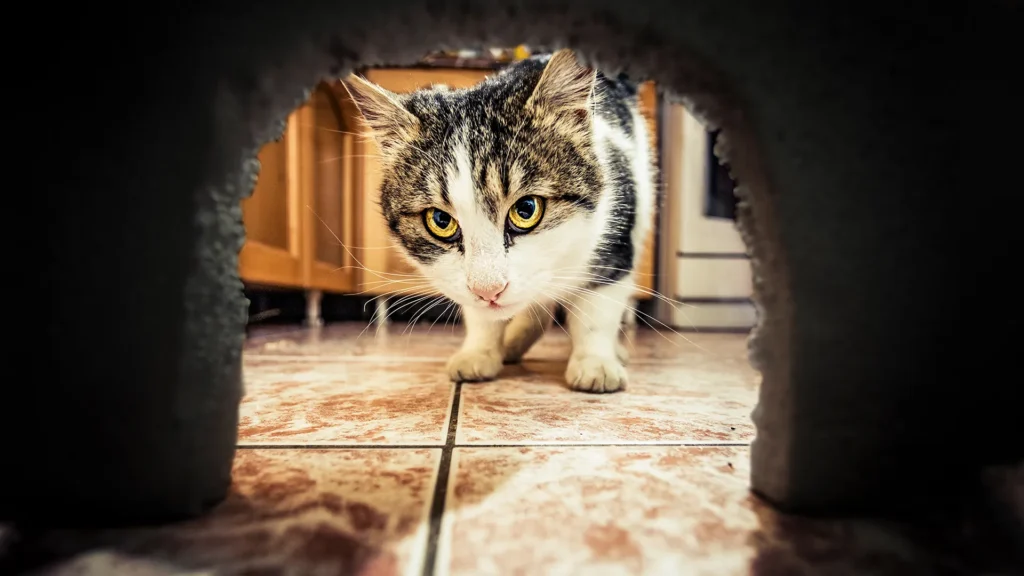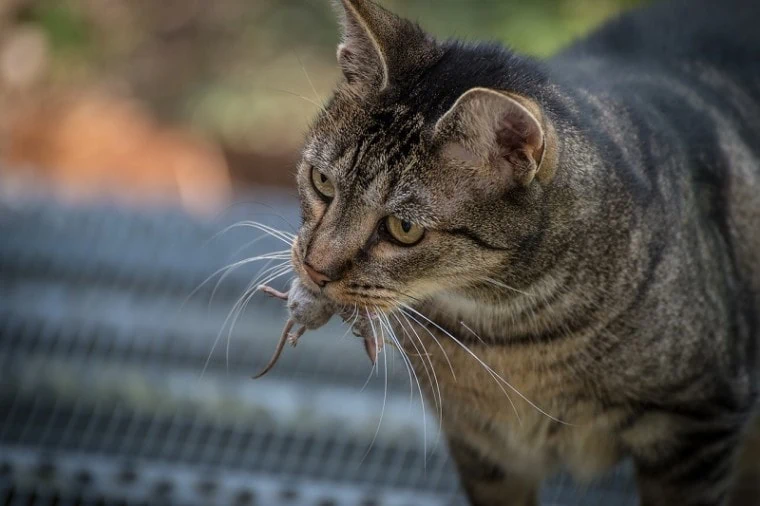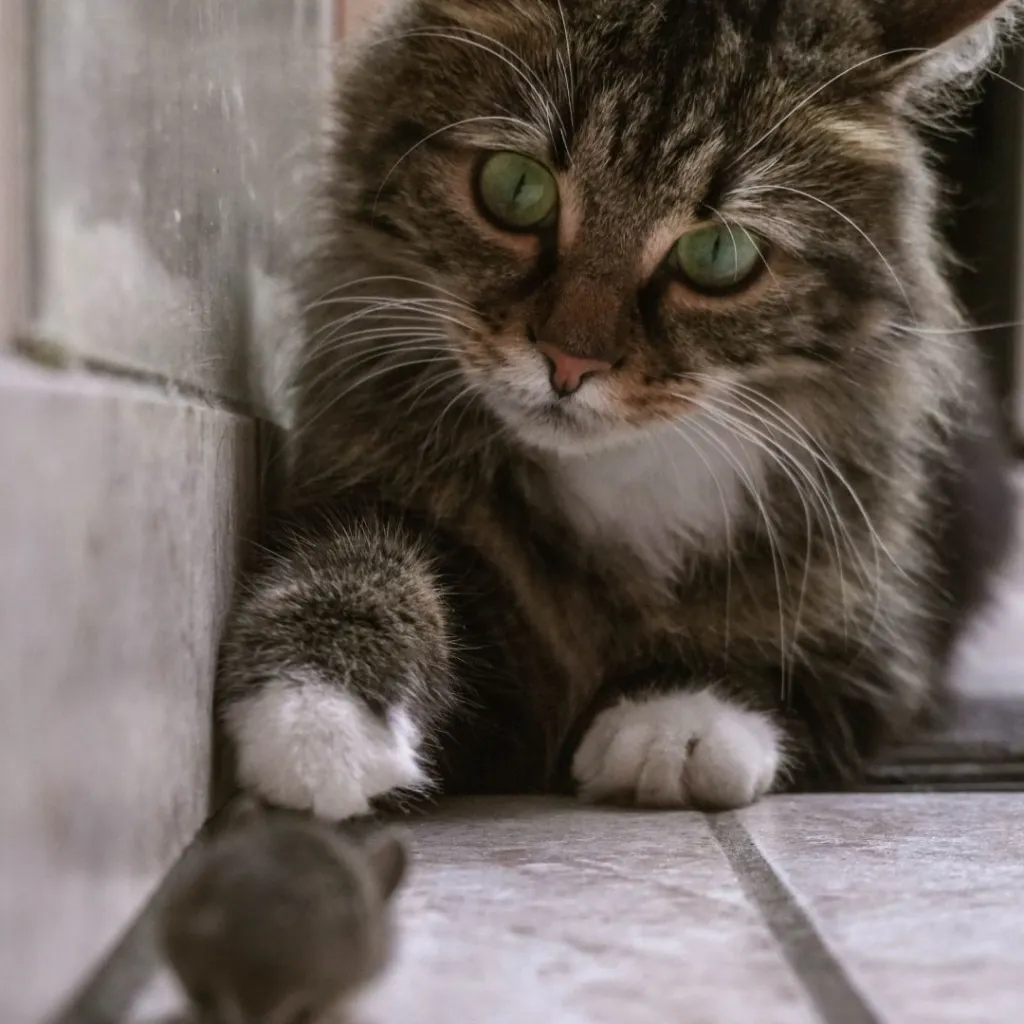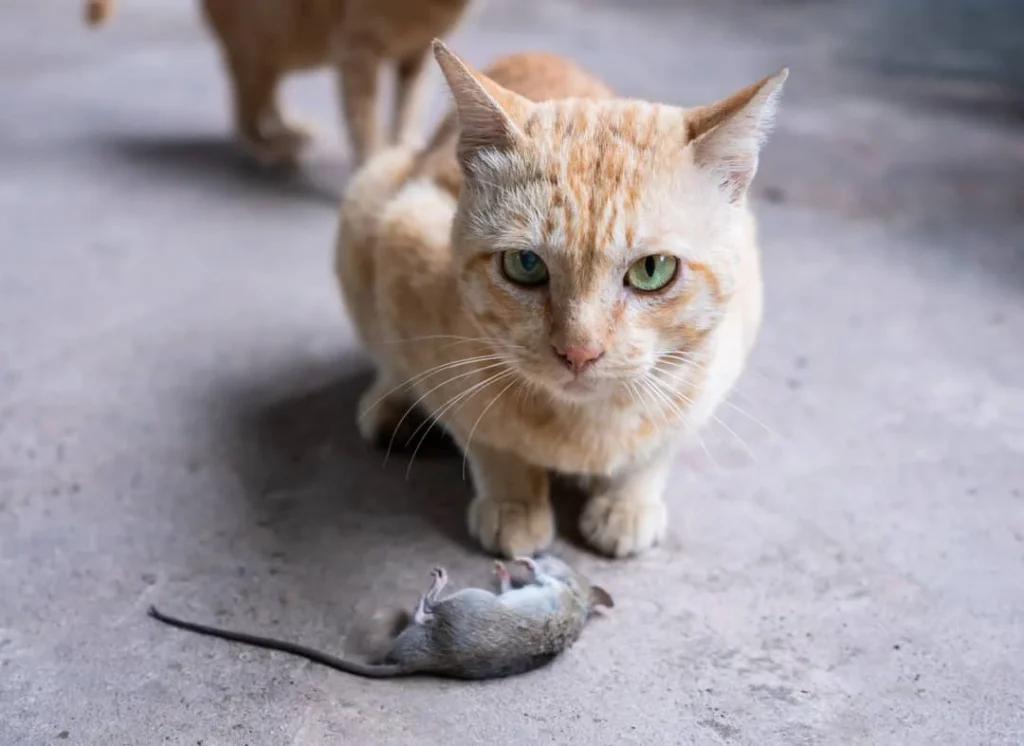
Cats are known for their hunting instincts, and many people believe that having a cat in the house can help control rodent populations. But do cats really help get rid of mice? The answer is not a simple yes or no.
While cats are natural predators of mice, their hunting abilities vary greatly depending on the individual cat. Some cats are excellent hunters and will actively seek out and catch mice, while others may have no interest in hunting at all. Additionally, even if a cat is a good hunter, it may not be enough to completely control a mouse infestation in a house.
Effective rodent control requires a multi-faceted approach, including sealing up entry points, removing food sources, and using traps or other methods in addition to a cat. While a cat can be a helpful addition to a rodent control plan, it should not be relied on as the sole method of getting rid of mice in a house.
Cats are known for their hunting instincts, and one of their favorite prey is mice. Mice are small rodents that can cause damage to homes and spread diseases. Many people wonder if having a cat in the house can help get rid of mice.
It is a well-known fact that cats are natural hunters and predators. They have been domesticated for thousands of years and have been used to control pests such as mice, rats, and other small animals. Cats have a keen sense of smell and hearing, which makes them excellent hunters. They can detect the presence of mice from a distance and are quick to pounce on them.
Cats are also known for their agility and speed, which makes them very effective at catching mice. They possess sharp claws and teeth which they utilize to capture their prey. Once they catch a mouse, they often play with it before killing it. So it's quite casual to understand why sometimes people ask themselves, "my cat killed a mouse but didn't eat it" and find yourself in doubt and questioning. The explanation is easy, this behavior is not just for fun; it is also a way for cats to hone their hunting skills.
In the wild, cats are solitary animals that hunt for their food. In contrast, domestic cats are typically provided with food by their owners and do not rely on hunting for sustenance. However, their hunting instincts are still intact, and they will hunt for mice and other small animals if given the opportunity.
Overall, cats can be effective at getting rid of mice in the house. Nevertheless, it's crucial to recognize that not all felines excel at hunting. Certain cats may lack interest or lack the requisite hunting abilities. Additionally, it's essential to acknowledge that cats may not be able to eradicate a mouse infestation entirely.

Cats have a long history of being skilled hunters and predators. The process of domesticating cats dates back approximately 10,000 years, as wild felines were drawn to human settlements in search of sustenance and refuge. As humans recognized the cats' prowess in hunting, they gradually transitioned into being kept as companions.
Cats are natural hunters and are known for their ability to catch mice and other small animals. They are agile, quick, and have excellent eyesight and hearing, which makes them well-suited for hunting. Cats have been employed for centuries as a natural means of pest control due to their adeptness at catching mice.
During ancient times in Egypt, cats were revered for their hunting prowess and were esteemed as divine beings, even worshipped as deities. Their images frequently appeared in art and were thought to possess mystical attributes. In medieval Europe, cats were housed in residences and aboard ships to manage rodent activity.
Today, cats are still used as mousers in many parts of the world. Cats are frequently enlisted on farms and in warehouses to regulate populations of mice and other nuisance pests. Some cats are even trained to hunt in the wild, where they can help control the population of small animals that can damage crops.
Overall, cats have a long and storied history as skilled hunters and mousers. Their innate hunting instincts and agility make them effective hunters, able to catch mice with ease.

Cats have a long history of hunting rodents, dating back thousands of years. The interaction between cats and rodents as predator and prey is multifaceted, influenced by various factors. When a cat encounters a mouse or a rat, it will instinctively try to catch it. The cat's sharp claws and teeth are well-suited for this task, and it will use a combination of stalking, chasing, and pouncing to catch its prey.
Cats have a number of natural hunting instincts and techniques that make them effective at catching rodents. For example, they have excellent vision, hearing, and smell, which allows them to detect the presence of rodents from a distance. They are also very agile and can move quickly and quietly, which makes it easier for them to sneak up on their prey.
The relationship between cats and mice has evolved over millions of years. Cats have been hunting rodents for so long that it has become an instinctual behavior. Similarly, rodents have evolved to be wary of cats and to avoid them whenever possible. This evolutionary history has led to a dynamic where cats are natural predators of rodents, and rodents are natural prey of cats.
The size of the prey and the breed of the cat can both affect hunting success. Larger prey, such as rats, may be more difficult for cats to catch than smaller prey, such as mice. So if you were asking yourself if do cats kill rats or just mice, well, it depends on both the breed of the cat, and the size of the rat. Similarly, some cat breeds are better suited for hunting than others. As an illustration, Siamese cats are renowned for their adeptness in hunting, whereas Persian cats are generally less inclined to engage in hunting activities.
Overall, while cats may not completely eliminate a rodent problem, they can be an effective tool in controlling it. By understanding the natural predator-prey relationship between cats and rodents, homeowners can use cats to deter rodents from entering their homes and to keep their property rodent-free.

Cats have been known to be excellent hunters and have been used by humans for centuries to control mouse populations. However, their effectiveness as mousers can vary depending on the environment they are in.
Farm cats are often considered to be the best mousers due to their natural hunting instincts and the abundance of prey in their environment. They are known to be effective in controlling mouse populations in barns, fields, and other agricultural areas. In fact, many farmers rely on cats to keep their crops and livestock safe from rodent infestations.
Cats in urban and suburban settings face different challenges when it comes to controlling mouse populations. The presence of humans, other pets, and the lack of natural prey can make it more difficult for cats to hunt effectively. Additionally, many neighborhoods have laws and regulations that restrict the number of cats a household can have, which can limit their effectiveness in controlling mouse infestations.
Indoor cats may not have access to as many mice as outdoor cats, but they can still be effective in controlling mouse populations within the home. They can be trained to hunt and can be given toys and treats to simulate the hunting experience. Conversely, outdoor cats have greater access to hunting grounds and can traverse larger territories, thereby increasing their opportunities to engage in hunting activities. However, they may also be exposed to more dangers such as traffic and other predators.
There have been several case studies and examples of successful mousers in various settings. For example, in Chicago, a group of feral cats were brought in to control a rat infestation in an alleyway. Within six months, the rat population had decreased significantly. In New York City, the "Working Cats" program places cats in businesses and warehouses to control mouse populations. These cats are often adopted from animal shelters and given a second chance at life while also providing a valuable service to their new owners.
Overall, cats can be effective in controlling mouse populations in a variety of settings. However, their effectiveness can vary depending on the environment they are in and the training they receive. It is important to consider these factors when deciding whether or not to use cats as a means of controlling rodent infestations.

Cats are renowned for their hunting prowess and their knack for capturing mice. However, not all cats are equally effective in catching mice. Several factors can affect a cat's ability to catch mice. In this section, we will discuss some of the factors that can affect a cat's ability to catch mice.
A cat's age, health, and agility can all affect its ability to catch mice. Younger cats are generally more active and agile than older cats, which can make them better hunters. Similarly, cats that are in good health and have good eyesight and reflexes are more likely to catch mice than cats that are sick or have poor eyesight.
Cats that have been trained to hunt or have had previous experience with hunting are more likely to catch mice than cats that have not. Training can include playing with toys that mimic prey or providing opportunities for the cat to catch live prey. Cats that have had previous experience with hunting are more familiar with the behavior of mice and are more likely to be successful in catching them.
A cat's temperament and individual personality traits can also affect its ability to catch mice. Certain felines exhibit more aggression and possess a stronger innate drive to hunt, rendering them more adept at catching prey. Similarly, cats that are more curious and adventurous may be more successful in catching mice than cats that are more cautious.
Cats use scent marking and territorial behavior to communicate with other cats and mark their territory. This behavior can also play a role in their ability to catch mice. Cats that mark their territory more frequently may be more successful in catching mice because they are more familiar with the area and the behavior of the mice.
Human interventions, such as feeding, can also affect a cat's hunting motivation. Cats that are well-fed may be less motivated to hunt and catch mice because they are not as hungry. Conversely, cats that are hungry may be more motivated to hunt and catch mice. Finding the right balance between ensuring your cat receives proper nutrition and preserving its natural hunting instincts is crucial.
In summary, several factors can affect a cat's ability to catch mice, including its age, health, agility, training and previous experience with hunting, temperament and individual personality traits, scent marking and territorial behavior, and human interventions such as feeding. With a deeper understanding of these factors, cat owners can better support their feline companions in their natural role as hunters, potentially aiding in the reduction of mice populations in their surroundings.
Overall, while natural pest control with cats has its advantages, it is important to consider the potential drawbacks and take a holistic approach to pest management.
While cats are known for their ability to hunt and kill mice, there are other methods of mouse control that can be just as effective. Here are some alternative options that homeowners can consider:
Traditional snap traps and glue traps are effective at catching mice, but they require frequent monitoring and disposal. Humane live traps are also available, which allow mice to be caught and released elsewhere.
Repellents such as peppermint oil and mothballs can also be used to deter mice from entering a home. Nevertheless, these approaches might not yield the same efficacy as traps and may necessitate frequent reapplication.
Electronic and ultrasonic devices emit high-frequency sound waves that are said to repel mice. Although some research has demonstrated the effectiveness of these gadgets, contrasting findings suggest their inefficacy. It is important to note that these devices may not work in areas with a lot of background noise.
Biological control methods involve introducing natural predators of mice, such as owls or snakes, into an area. Natural repellents, such as predator urine or plants like mint or lavender, can also be used to deter mice.
Integrative pest management (IPM) combines multiple methods of pest control to create a comprehensive approach. This can include using traps, repellents, and biological control methods in combination. By using multiple methods, homeowners can create a more effective and sustainable mouse control plan.
Overall, there are many alternatives to cats for mouse control. Homeowners should consider their individual needs and preferences when choosing a method of mouse control. Maintaining cleanliness within your living space, sealing off entry points, and eliminating potential food sources are also effective strategies for deterring mice.
Cats naturally prey on mice, which can serve as a deterrent for mice entering a home or building. However, it's crucial to understand that not all cats are proficient hunters, and some may show no interest in pursuing mice. Additionally, if there is a large mouse infestation, one cat may not be enough to keep them at bay.
If a cat is a skilled hunter and there are only a few mice present, then yes, a cat can help get rid of mice. While cats can be effective at catching mice, they may not entirely eradicate a mouse infestation. It's advisable to complement a cat's efforts with other pest control methods for comprehensive mouse elimination.
There are several alternative methods to cats for eliminating mice infestations, including traps, baits, and repellents. Traps can be humane or lethal, and baits can be poison or non-toxic. Natural and chemical-based repellents are available, and it's essential to select a method that suits the situation and is both safe and effective. Conducting research before choosing a repellent is crucial.
Cats can help get rid of mice, but it is not guaranteed. It depends on the cat's hunting skills and the severity of the mouse infestation. Employing other methods alongside a cat is advised for effectively eradicating mice.
Cats can be effective against mice if they are skilled hunters and there are only a few mice present. However, if there is a large mouse infestation, one cat may not be enough to keep them at bay. Supplementing a cat with other methods is recommended to effectively eradicate mice.
Cats can help with mice by acting as a deterrent and catching mice. However, it's important to acknowledge that not all cats possess the skill or inclination to hunt mice effectively. Additionally, if there is a large mouse infestation, one cat may not be enough to keep them at bay.
Cats kill mice with a precise bite to the neck, quickly immobilizing them without much blood.
Cats' natural hunting instincts drive them to kill, but they might not eat the mice if they're well-fed at home. So, answering a question that we have all had for years, “Why do cats kill mice but not eat them?”, the cat acts as a hunter and provides us with prey, but does not necessarily eat it.
Cats have been known to be natural predators of rodents, including mice. They have been domesticated for thousands of years and have been used for pest control in many households. Cats are effective in controlling mice populations, especially in areas where mice infestations are common. They are agile, quick, and efficient in catching and killing mice.
While cats are effective in controlling mice populations, it is important to consider the ecological and ethical implications of using cats for pest control. Cats are predators and can have a significant impact on local wildlife populations. They can also be exposed to harmful chemicals and diseases when hunting mice. Therefore, it is important to use cats responsibly for pest control and consider alternative measures such as trapping and exclusion.
In conclusion, cats can be effective in controlling mice populations, but it is important to use them responsibly and consider alternative measures. Homeowners should implement measures to control and prevent mice infestations, including sealing entry points and eliminating food sources. If using cats for pest control, they should be kept indoors and regularly checked for exposure to harmful chemicals and diseases. By making responsible decisions, homeowners can effectively control mice populations while minimizing the impact on local ecosystems.
If your cat is not in hunter mode and you need some professional help, Critter Stop is here for you! We have provided our rat and mice removal services all over the Dallas area, helping homeowners deal with rodent invasions. Contact us at (214) 234-2616 to recover your peace of mind and say goodbye to rodents in your house!
Visit our Critter Library and learn more about our furry friends